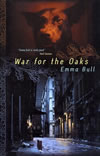War for the Oaks
Reading Emma Bull's 1987 fantasy of the war in Faerie for possession of Minneapolis War for the Oaks, I was struck by the impression that the entire genre of elfpunk is really about the way intelligent and sympathetic Europeans and Americans view each other today.
The denizens of Faerie are achingly beautiful and dress really well; Americans who stroll down the streets of Paris or Milan have the same feeling. Elves (and vampires) possess an ancient culture, bound up with arcane customs and incomprehensible courtesies and rituals. They make and own beautiful things, they treasure nature, and to them nature is cultivated, tamed, and comfortable. They have titles, They have great sex.
To the faerie court, mortals often seem ignorant, inexperienced, and clumsy. But mortals are also endlessly fascinating and strangely alluring; without the strictures of tradition and custom, mortals create things of which faeries never dreamed. Their art has raw power and excitement, and by elven standards the mortals have a charming directness, enthusiasm, and simplicity. And even the most powerful members of the faerie court always sense that this is the age of mortals, that mortals are somehow at the center of things.
Mortals can't understand why ancient faerie rivalries matter so much, why the Seelie and Unseelie court need to fight their interminable war. Why not just sit down, work it out, shake hands, move on? To immortals, this seems foolish and naive -- except that for some reason it seems to work. The American Civil War was horrible, yes, but once it was over, it was over. In Faerie, they remember these things more vividly and keep their anger fresh. The elves would still support guerilla bands in the Appalachians, they would hold armed marches, riots, and bombings to honor the memory of Tippecanoe and the Battle of Quebec.
See also Neil Gaiman (Great Britain), American Gods, and William Gibson (Canada), Pattern Recognition, and Laurel Hamilton (U.S.), A Kiss of Shadows.
